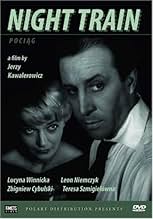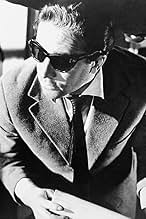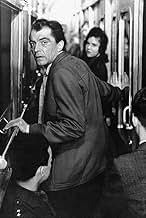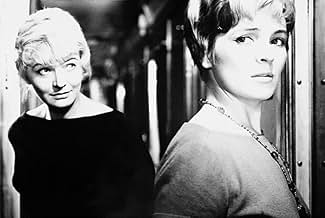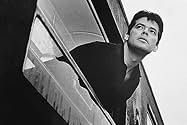Pociag
- 1959
- 1 घं 39 मि
IMDb रेटिंग
7.7/10
3.9 हज़ार
आपकी रेटिंग
अपनी भाषा में प्लॉट जोड़ेंJerzy enters a train set for the Baltic coast. He seems to be on the run from something, as does the strange woman with whom he must share a sleeping compartment.Jerzy enters a train set for the Baltic coast. He seems to be on the run from something, as does the strange woman with whom he must share a sleeping compartment.Jerzy enters a train set for the Baltic coast. He seems to be on the run from something, as does the strange woman with whom he must share a sleeping compartment.
- निर्देशक
- लेखक
- स्टार
- पुरस्कार
- 2 जीत और कुल 1 नामांकन
Andrzej Herder
- Sailor
- (बिना क्रेडिट के)
Barbara Horawianka
- Jerzy's Wife
- (बिना क्रेडिट के)
फ़ीचर्ड समीक्षाएं
Night Train is the first film I've seen from highly rated Polish director Jerzy Kawalerowicz and it's a highly impressive film too! The film takes on a Hitchcockian style, although Kawalerowicz' directorial style is more sombre than Hitchcock's and the film straddles the line between thriller/mystery and drama excellently. As the title suggests, the film is set aboard a train, and the director really makes good use of this setting as the claustrophobia of the vehicle is constantly imposed, and other elements such as the chance of meeting strangers on a train and the idea of a lot of different people being together in one place also come into play. The film focuses on Jerzy; a mysterious man who boards a train on course for the Baltic coast. It soon becomes apparent that the man has a high need for privacy, and this is disrupted by Martha, a woman who he finds in his compartment. At first he seems keen to get rid of her, but later reluctantly agrees to let her stay. It later transpires that the police are on the hunt for a man who murdered hid wife...and Jerzy finds himself under suspicion.
The film is stylishly shot and Kawalerowicz' style reminded me somewhat of the "Nouvelle Vogue" style that was popular in France around the early sixties. The black and white picture helps to impose a dark atmosphere on the film and this in turn helps to build the mystery surrounding the central character. The characters themselves are all interesting and the way that the director feeds us more information about each one as the film progresses is well done and helps to keep the audience interested in the film. The acting courtesy of Leon Niemczyk and Lucyna Winnicka in the central roles is excellent and both performers give their characters plenty of credibility. The murderer plot often feels like something of a spare wheel to the other things going on in the film, but I think this was intended as by not putting the full focus on this plot, more time is given to developing the characters. The results of this plot are stunning, however, and the sequence that finally sees the murderer chased down is well shot and highly memorable. As the film winds down, Jerzy Kawalerowicz gives us an interesting take on the twist ending and this helps to separate Night Train further from the majority of other thrillers. Overall, this is a fascinating little thriller and comes highly recommended!
The film is stylishly shot and Kawalerowicz' style reminded me somewhat of the "Nouvelle Vogue" style that was popular in France around the early sixties. The black and white picture helps to impose a dark atmosphere on the film and this in turn helps to build the mystery surrounding the central character. The characters themselves are all interesting and the way that the director feeds us more information about each one as the film progresses is well done and helps to keep the audience interested in the film. The acting courtesy of Leon Niemczyk and Lucyna Winnicka in the central roles is excellent and both performers give their characters plenty of credibility. The murderer plot often feels like something of a spare wheel to the other things going on in the film, but I think this was intended as by not putting the full focus on this plot, more time is given to developing the characters. The results of this plot are stunning, however, and the sequence that finally sees the murderer chased down is well shot and highly memorable. As the film winds down, Jerzy Kawalerowicz gives us an interesting take on the twist ending and this helps to separate Night Train further from the majority of other thrillers. Overall, this is a fascinating little thriller and comes highly recommended!
Sadly, I can't agree with most people who find this film to be Hitchcockesque in its representation of a thriller.
To say this would be to say that your Jaguar is just like a Mercedes. They might both be fine cars, but they are in no way alike.
The really quite simplistic plot travels at a slow and in many ways, inexplicable pace. There is little tension built up, and, for the most part, little mystery to be found.
However, don't take any of this to be a retrograde description.
The various small character subplots and interactions are wonderful. The whole journey has a quite haunting feel to it, which I find I am at loss to explain, because if I analyse the film, there is no real reason to this feeling. And yet, there it is.
The beautiful and mysterious Lucyna Winnicka is utterly mesmerising.
In so many ways this film shouldn't work with anything like the power it achieves, but somehow it does. If it captures you in the way it has me, then it will stay with you long after the event, from the strange individual passengers right down to the oh so ethereal soundtrack.
I am without explanation, but I truly hope it gives you the feeling of something wonderful it gave me.
To say this would be to say that your Jaguar is just like a Mercedes. They might both be fine cars, but they are in no way alike.
The really quite simplistic plot travels at a slow and in many ways, inexplicable pace. There is little tension built up, and, for the most part, little mystery to be found.
However, don't take any of this to be a retrograde description.
The various small character subplots and interactions are wonderful. The whole journey has a quite haunting feel to it, which I find I am at loss to explain, because if I analyse the film, there is no real reason to this feeling. And yet, there it is.
The beautiful and mysterious Lucyna Winnicka is utterly mesmerising.
In so many ways this film shouldn't work with anything like the power it achieves, but somehow it does. If it captures you in the way it has me, then it will stay with you long after the event, from the strange individual passengers right down to the oh so ethereal soundtrack.
I am without explanation, but I truly hope it gives you the feeling of something wonderful it gave me.
This is definitely one of the greatest, and at the same time, one of the most under-appreciated movies in the history of Polish cinema. Jerzy Kawalerowicz is a true master craftsman in the country's film world, and with Night Train he once again proved that this statement is perfectly true. It's a shame that the movie is sometimes cruelly omitted when talking about fine post-war cinema, because it is certainly worth a watch.
Night Train is different from other various Polish movies that came out in the 50's and later, as it doesn't present the social problems that the country had to fight with during the difficult period of Communism.
It reminds me of the movies directed by the Master of Suspense, Sir Alfred Hitchcock, as it contains the recurring themes of murder, suspenseful mystery, the wrongly accused man and a search for the real criminal.
It also reminds me of the great noir movies produced in the United States or Italy throughout the 20th century. It possesses a deeply sombre tone and claustrophobic ambiance created by the particular scenery, in which it takes place - a train. All of this is complemented with an eerie music playing in the background.
Aboard the train, which goes from Lodz to the seaside in Poland, there are many unusual, strangely mysterious, and overly suspicious passengers. One of them is Jerzy, the main character, played brilliantly by Leon Niemczyk. Strolling around in his classy dark glasses he seems like he needs to hide from something or someone. Unfortunately, due to some peculiar circumstances, he has to share the sleeping cabin with a pretty lady, Marta. However, as time passes by, the two are starting to have a connection, because of the seemingly similar life experiences and peculiar interests.
In the neighboring compartment we can find an unnamed man with his nosy wife, who quickly starts to flirt with distracted Jerzy. She looks so unhappily married that she resolves to flirting with almost all of the co-travelers.
Then there is also Staszek, the boy, who is deeply in love with Marta, but, due to some unmentioned previous occurrences, she doesn't want to be with him any more.
All those characters' affairs intertwine at various points in the storyline. Great and clever dialogues accompany every scene. And in the middle of it all there is the tranquil search for the murderer. However, as important as it may seem sometimes, it isn't actually the main topic of Night Train.
The hunt for the killer occurs in the climax of the movie, when an angry mob runs through the train cars and into the woods to finally catch him. What happens next – the public execution (however not deadly) reminded me of the great western The Ox-Bow Incident. The will of the majority always wins, no matter if someone is legally found guilty or not.
The final scene beautifully reflects what had happened on that night - the compartments are empty, and look somehow pure, but the scattered belongings and open windows give the sequence an obscure touch.
All in all, Night Train is truly a fantastic Polish movie with many suspenseful twists, romance and a huge emphasis put on various characters' personalities, in order to show that anonymity is omnipresent and everyone can almost hide in its shadow if he wants to.
Night Train is different from other various Polish movies that came out in the 50's and later, as it doesn't present the social problems that the country had to fight with during the difficult period of Communism.
It reminds me of the movies directed by the Master of Suspense, Sir Alfred Hitchcock, as it contains the recurring themes of murder, suspenseful mystery, the wrongly accused man and a search for the real criminal.
It also reminds me of the great noir movies produced in the United States or Italy throughout the 20th century. It possesses a deeply sombre tone and claustrophobic ambiance created by the particular scenery, in which it takes place - a train. All of this is complemented with an eerie music playing in the background.
Aboard the train, which goes from Lodz to the seaside in Poland, there are many unusual, strangely mysterious, and overly suspicious passengers. One of them is Jerzy, the main character, played brilliantly by Leon Niemczyk. Strolling around in his classy dark glasses he seems like he needs to hide from something or someone. Unfortunately, due to some peculiar circumstances, he has to share the sleeping cabin with a pretty lady, Marta. However, as time passes by, the two are starting to have a connection, because of the seemingly similar life experiences and peculiar interests.
In the neighboring compartment we can find an unnamed man with his nosy wife, who quickly starts to flirt with distracted Jerzy. She looks so unhappily married that she resolves to flirting with almost all of the co-travelers.
Then there is also Staszek, the boy, who is deeply in love with Marta, but, due to some unmentioned previous occurrences, she doesn't want to be with him any more.
All those characters' affairs intertwine at various points in the storyline. Great and clever dialogues accompany every scene. And in the middle of it all there is the tranquil search for the murderer. However, as important as it may seem sometimes, it isn't actually the main topic of Night Train.
The hunt for the killer occurs in the climax of the movie, when an angry mob runs through the train cars and into the woods to finally catch him. What happens next – the public execution (however not deadly) reminded me of the great western The Ox-Bow Incident. The will of the majority always wins, no matter if someone is legally found guilty or not.
The final scene beautifully reflects what had happened on that night - the compartments are empty, and look somehow pure, but the scattered belongings and open windows give the sequence an obscure touch.
All in all, Night Train is truly a fantastic Polish movie with many suspenseful twists, romance and a huge emphasis put on various characters' personalities, in order to show that anonymity is omnipresent and everyone can almost hide in its shadow if he wants to.
A bird's-eye view of a crowded train station. A haunting, almost chilling jazz score with sensuous female vocals. Crisp black and white cinematography. You can't help but get the feel of a high quality noir film right from the first frame. The myriad human beings look like small creatures scurrying in all directions. It's a seemingly normal view at a train station. Soon, as the view draws closer, we get a glimpse of some of the primary players in this strangely ambiguous psychological drama.
A dapper looking man with sunglasses, Jerzy (Leon Niemczyk) enters the train compartment without a ticket (saying that he forgot everything at home) and insists on buying his way into the train, and also the neighbouring berths 'cause he wants to alone. He seems to be tensed, possibly just wants to go away some place, hardly smiles, and smokes a lot of cigarettes. A beautiful young blonde, Marta (Lucyna Winnicka) makes an appearance. She has a certain sadness in her eyes. She obviously has something to hide and is probably on the run from something. A younger man (Zbigniew Cybulski), hot on her pursuit, enters ticket-less and proceeds to constantly stalk her, every chance he gets. As luck would have it, some sort of technical error leads to Marta and Jerzy ending up in the same coupe of two berths. Both of them are visibly disconcerted by this, but eventually give in, and are forced to spend the night in the company of each other, owing to lack of any other option.
It's the holidays and the train is practically overflowing, as passengers crowd the corridors. They are a motley crew of individuals with varied behavioral traits and their own quirks. There are a group of ogling men who lustfully eye practically every woman that passes by. There's a flirtatious, married woman (Teresa Szmigielówna) trying to seek the attention of Jerzy every chance she gets, even at the momentary halts at the intermediate stations. For a while we can only hear her husband's voice, who seems to be a lawyer, and for some reason, seems to be a very boring companion! There's a young sailor who quietly stares in admiration at a pretty young thing, throughout the train journey. And then there's an man, an insomniac who cannot sleep in the bunk beds because they remind him of his concentration camp days, so he spends his time reading in the corridor.
Amidst all the chaos, there is some gossip about the latest news of a man who killed his wife and fled! A lot of conversations, exchanges of glances, vague ramblings later, the journey turns into an eventful one for all the passengers. The train suddenly stops at an unknown location, where official authorities board the train, for they have information that there is a wanted killer on board! Which of these ensemble of characters is the person they are looking for? There are suddenly grapevines, as doubt and tension fill the environment, and the characters we are by now familiar with, begin to exhibit a gradual transformation of sorts .
Jerzy Kawalerowicz's "Night Train" (Original title: Pociag) is not much about its plot. It is, in fact, a very realistic study of how a given group of people would behave and make judgments based on whatever little information they have. Passengers on a train are mostly strangers to each other. But a lot is judged (or misjudged) based on their overall demeanor, body language, personality, and what-not. It is a strikingly natural aspect of any human being and "Night Train" brings it out like no other! The lead characters are both strangers to each other, and in that one night together, they seem to assume quite a few things about each other. So do the other passengers. Where the director plays a winning hand, is at his tactful handling of the screenplay by keeping things deliberately ambiguous for the most part, playing a clever trick on the audience, by keeping them guessing constantly, as they start framing their initial mental perceptions about the various characters. The viewer, then, becomes a passenger himself, the kind of curious bystander who makes enquiries in hushed whispers, despite knowing that its none of his/her business. Or the kind that pushes the others aside to be amongst the first to know more and gossip about it; or the kind of person who starts judging based on initial impressions.
So what is the reality of all these characters then? We are given a hint of it much later, although not everything is declared explicitly. Kawalerowicz's ploy lies in keeping almost everything under wraps until the final half hour when some subtle twists almost sharpen the blurs, but not entirely! It is also during this time that we learn how a society as a whole, goes up in arms, against anything deemed wrong in the conventional sense. Somewhere amidst all the chaos, we, as individuals of society are also shown the mirror. It is alarming how people can turn their backs on you and stop at nothing to malign or blacklist you, just as quickly as they can turn you into a hero! Kawalerowicz's film has some extraordinary camera-work (apparently most of the train corridor scenes were shot on a set; it is almost impossible to make out), which has its highly realistic effect on the viewer (the suffocating feeling of trying to squeeze through a narrow, crowded passageway). It also has some great performances, especially by the two leads, Leon Niemczyk and Lucyna Winnicka, and there's some riveting drama and mesmerizing score to go along. But "Night Train" goes way beyond its very enticing exterior of a claustrophobic, tense noir, a supposed nod to Hitchcock's thrillers. It makes a very important statement on societal dynamics.
A hidden gem, a winner all the way!
A dapper looking man with sunglasses, Jerzy (Leon Niemczyk) enters the train compartment without a ticket (saying that he forgot everything at home) and insists on buying his way into the train, and also the neighbouring berths 'cause he wants to alone. He seems to be tensed, possibly just wants to go away some place, hardly smiles, and smokes a lot of cigarettes. A beautiful young blonde, Marta (Lucyna Winnicka) makes an appearance. She has a certain sadness in her eyes. She obviously has something to hide and is probably on the run from something. A younger man (Zbigniew Cybulski), hot on her pursuit, enters ticket-less and proceeds to constantly stalk her, every chance he gets. As luck would have it, some sort of technical error leads to Marta and Jerzy ending up in the same coupe of two berths. Both of them are visibly disconcerted by this, but eventually give in, and are forced to spend the night in the company of each other, owing to lack of any other option.
It's the holidays and the train is practically overflowing, as passengers crowd the corridors. They are a motley crew of individuals with varied behavioral traits and their own quirks. There are a group of ogling men who lustfully eye practically every woman that passes by. There's a flirtatious, married woman (Teresa Szmigielówna) trying to seek the attention of Jerzy every chance she gets, even at the momentary halts at the intermediate stations. For a while we can only hear her husband's voice, who seems to be a lawyer, and for some reason, seems to be a very boring companion! There's a young sailor who quietly stares in admiration at a pretty young thing, throughout the train journey. And then there's an man, an insomniac who cannot sleep in the bunk beds because they remind him of his concentration camp days, so he spends his time reading in the corridor.
Amidst all the chaos, there is some gossip about the latest news of a man who killed his wife and fled! A lot of conversations, exchanges of glances, vague ramblings later, the journey turns into an eventful one for all the passengers. The train suddenly stops at an unknown location, where official authorities board the train, for they have information that there is a wanted killer on board! Which of these ensemble of characters is the person they are looking for? There are suddenly grapevines, as doubt and tension fill the environment, and the characters we are by now familiar with, begin to exhibit a gradual transformation of sorts .
Jerzy Kawalerowicz's "Night Train" (Original title: Pociag) is not much about its plot. It is, in fact, a very realistic study of how a given group of people would behave and make judgments based on whatever little information they have. Passengers on a train are mostly strangers to each other. But a lot is judged (or misjudged) based on their overall demeanor, body language, personality, and what-not. It is a strikingly natural aspect of any human being and "Night Train" brings it out like no other! The lead characters are both strangers to each other, and in that one night together, they seem to assume quite a few things about each other. So do the other passengers. Where the director plays a winning hand, is at his tactful handling of the screenplay by keeping things deliberately ambiguous for the most part, playing a clever trick on the audience, by keeping them guessing constantly, as they start framing their initial mental perceptions about the various characters. The viewer, then, becomes a passenger himself, the kind of curious bystander who makes enquiries in hushed whispers, despite knowing that its none of his/her business. Or the kind that pushes the others aside to be amongst the first to know more and gossip about it; or the kind of person who starts judging based on initial impressions.
So what is the reality of all these characters then? We are given a hint of it much later, although not everything is declared explicitly. Kawalerowicz's ploy lies in keeping almost everything under wraps until the final half hour when some subtle twists almost sharpen the blurs, but not entirely! It is also during this time that we learn how a society as a whole, goes up in arms, against anything deemed wrong in the conventional sense. Somewhere amidst all the chaos, we, as individuals of society are also shown the mirror. It is alarming how people can turn their backs on you and stop at nothing to malign or blacklist you, just as quickly as they can turn you into a hero! Kawalerowicz's film has some extraordinary camera-work (apparently most of the train corridor scenes were shot on a set; it is almost impossible to make out), which has its highly realistic effect on the viewer (the suffocating feeling of trying to squeeze through a narrow, crowded passageway). It also has some great performances, especially by the two leads, Leon Niemczyk and Lucyna Winnicka, and there's some riveting drama and mesmerizing score to go along. But "Night Train" goes way beyond its very enticing exterior of a claustrophobic, tense noir, a supposed nod to Hitchcock's thrillers. It makes a very important statement on societal dynamics.
A hidden gem, a winner all the way!
A man named Jerzy (Leon Niemczyk) is taking a Night Train along the Baltic coast, he wears dark sunglasses and by his body language we can tell he wants to be alone and to this end, he books a sleeping compartment all to himself, .But on entering his compartment he finds a young blonde woman named Marta (Lucyna Winnicka) occupying it, she refuses to leave even when the train inspector is called, but when the inspector threatens her with the police, Jerzy says forget about it and he lets her stay, suspicious behaviour as the very overcrowded train is awash with talk of the local murderer who is on the run from the police, Marta also seems to have something to hide and is being chased by a young suitor travelling in standard classic, in a train full of different character, could the killer be on board?Jerzy calls a truce with Marta and soon their conversation begins to open up, a bond gradually grows between the two but is interrupted when the police hunting for the killer, board the train in a remote area and immediately arrest Jerzy, can he prove his innocence on the remaining journey? Jerzy Kawalerowicz perhaps best known as the director of the superb tale of possession, Matka Joanna od aniolów (1961) here produces a Hitchcockian type thriller set on a train with equally successful results. Set to a jazzy score Andrzej Trzaskowski, which adds immensely to the atmosphere while also perfectly suiting the motion of the train, we are gradually introduced to many of the different characters on board, a large group on a pilgrimage, the desperately flirtatious wife of a Polish solicitor, intent on getting some attention from whoever will listen, the young priest travelling with his elderly Monsiegnor, we even get to know the train staff intimately. Jan Laskowski's cinematography is beautiful and captures the claustrophobia of the overcrowded train, but yet still retains a sense of movement in a confined space. The killer being chased at dawn across cold open fields by all on board is a highlight, it finishes with the killer's capture in a rundown graveyard. The films ending is quite apt and somewhat downbeat as all the travellers return to their own lives at their destination, after the excitement of the previous night.
क्या आपको पता है
- ट्रिवियाStaszek, the young man following Marta, is seen several times getting on the train after it has started moving. The inspector warns him a couple of times that it is dangerous. Zbigniew Cybulski who plays Staszek died a few years later, aged 39, after falling under a moving train he was attempting to board at Wroclaw Glowny railway station in Poland.
- कनेक्शनFeatured in Fejezetek a film történetéböl: A lengyel film (1990)
टॉप पसंद
रेटिंग देने के लिए साइन-इन करें और वैयक्तिकृत सुझावों के लिए वॉचलिस्ट करें
- How long is Night Train?Alexa द्वारा संचालित
विवरण
- चलने की अवधि1 घंटा 39 मिनट
- रंग
- ध्वनि मिश्रण
- पक्ष अनुपात
- 1.37 : 1
इस पेज में योगदान दें
किसी बदलाव का सुझाव दें या अनुपलब्ध कॉन्टेंट जोड़ें


